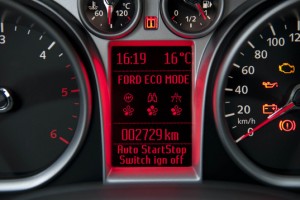 Ford Motor Company is feeling pretty good about itself these days. The company just announced its best quarterly profits this century. Profits reached $2.55 billion, up, 460 million, or 22% from a year ago. Rising demand for their new line of fuel-efficient vehicles, along with an improving economy, were seen as the main drivers.
Ford Motor Company is feeling pretty good about itself these days. The company just announced its best quarterly profits this century. Profits reached $2.55 billion, up, 460 million, or 22% from a year ago. Rising demand for their new line of fuel-efficient vehicles, along with an improving economy, were seen as the main drivers.
“Our team delivered a great quarter, with solid growth and improvements in all regions,” said Alan Mulally, Ford president and CEO.
The company’s new ECOnetic Fiesta with its 1.6 liter diesel engine, gets 65 mpg and emits less CO2 than the Toyota Prius. Unfortunately, it’s not available in the US. The 1.6 liter gasoline version of the Fiesta which is available here gets less than half the mileage. “We don’t have a full scale energy policy in place in the U.S. that promotes the usage of diesel fuel,” Ford spokesman Said Deep told Wired.com.
Meanwhile the diesel version is predicted to be the best selling car in England this year.
Having the distinction of being the only US automaker to pass on the bailout, Ford is moving quickly without the weight of that burden. The company credits “fuel-efficient new products, continued investment in global growth and the strengthening of Ford’s core business” with the positive results, as well as the fact that the earthquake in Japan had a relatively small impact on the automaker’s supply chain. According to the EPA’s fuel economy “mileage leaders” page, Ford has the lead in subcompact cars, small pickup trucks, and SUVs, three of the 14 categories that EPA uses to divide up the market. GM has the lead in large vans and pickup trucks.
But the company’s website claims that “Ford Motor Company offers at least 12 vehicles that lead their sales segments in fuel economy – including four vehicles with EPA-certified 40 mpg or higher fuel economy ratings – a claim no other full-line automaker can match.”
“Fuel economy and technology are consumers’ biggest priorities – and we have made them Ford’s as well,” said Mark Fields, Ford president, The Americas. “Our product portfolio reflects the investment Ford has made to transform our lineup in the past several years so our customers can be more green – and keep even more green in their wallets – than when fuel prices reached $4 per gallon in 2008,” and as they have once again in 2011.
The company attributes “improved aerodynamics and fuel-saving technologies including PowerShift, a Ford-designed dry dual-clutch automatic transmission available in the Ford Fiesta and all-new Focus, six-speed automatic transmissions, electric power-assisted steering (EPAS) and EcoBoost engines that save on fuel” for their leadership in the fuel economy marathon.
A number of power plant innovations also contribute to the fuel consumption savings, including:
- Twin independent variable camshaft timing (Ti-VCT), which enables the engine to operate at peak efficiency by continually adjusting the precise moment the intake and exhaust valves open
- Gasoline direct injection (GDI), which improves efficiency by raising the compression ratio and by using precise amounts of fuel placed directly in the combustion chamber
- Turbocharging, which uses exhaust gases to pressurize the engine cylinders with a more dense mixture of fuel and air, increasing power
- EcoBoost, which uses direct injection, turbocharging and variable valve timing to allow small engines to deliver the power of larger engines. EcoBoost engines save fuel in part because they burn less fuel and because they weigh less than the larger-displacement engines they replace
- EPAS, which eliminates drag on the engine by replacing the hydraulic pump with an electric motor.
These achievements by Ford prove, once again, that it is possible for a company to do well by doing good. Some might say that it was a long time coming, but sometimes it takes the experience of being pushed to the brink before a company, or an institution, or a society begins to truly change its ways.
RP Siegel is the co-author of the eco-thriller Vapor Trails, the first in a series covering the human side of various sustainability issues including energy, food, and water. Like airplanes, we all leave behind a vapor trail. And though we can easily see others’, we rarely see our own.
Follow RP Siegel on Twitter.
From: http://www.triplepundit.com/2011/05/ford-credits-move-green-vehicles-driver-behind-earnings-jump/






